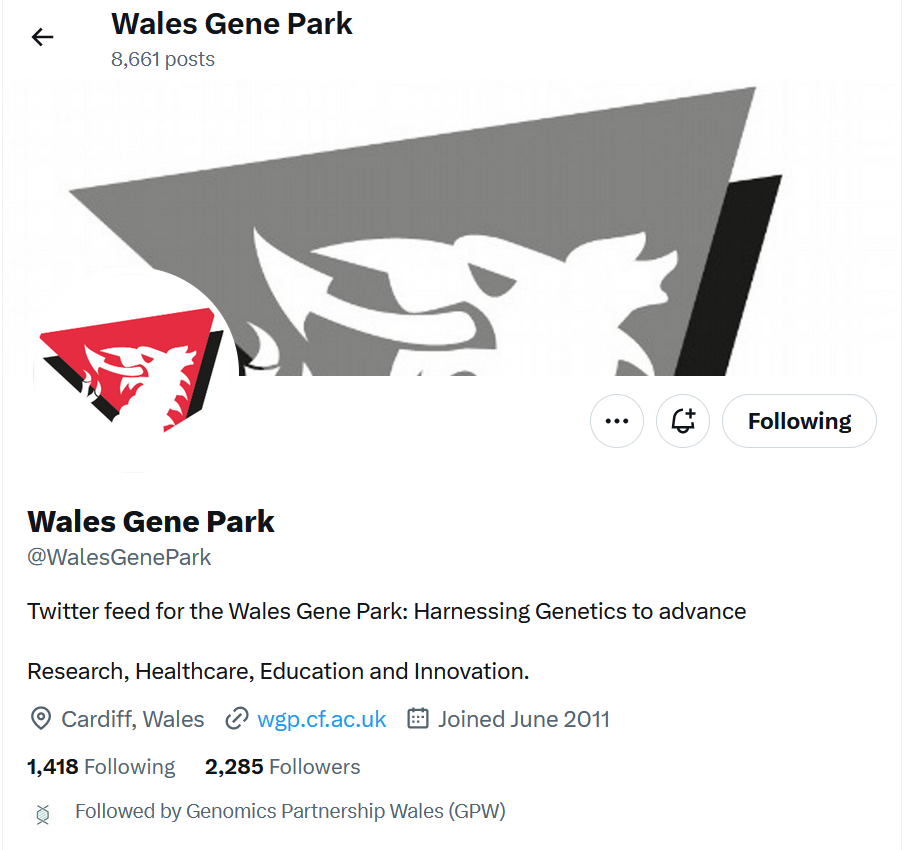OUR GENOMICS SERVICES
We provide bespoke sequencing and bioinformatic analysis to biomedical research scientists throughout Wales.
High-throughput (next generation) DNA and RNA sequencing is routinely utilised in modern genetic and biomedical research, for a range of applications. Wales Gene Park offers a flexible, bespoke approach to support researchers access high-throughput sequencing technology and associated bioinformatic analysis for biomedical research in Wales. We work with academic and non-academic colleagues, providing expert advice and support from project design through to tertiary analysis, to suit the needs of the research project. We work to ensure access to these technologies is at a reasonable cost to encourage effective uptake of this fundamental technology.
What we do
We provide colleagues with a complete pipeline for genomic scale DNA and RNA Sequence analysis in medically important areas of genetic research such as cancer, inherited cardiovascular disease and neurological disorders, that are priority areas for the Welsh Government. Our team will support your project from initial design through to grant applications, lab work, data generation, primary, secondary and tertiary analysis. We work collaboratively and flexibly with researchers to support their projects.
We are passionate in championing the role of high-throughput sequencing in modern biomedical research, working closely with research colleagues and encouraging improvement through workshops and seminars.
Our funding policy
Wales Gene Park is funded by Welsh Government through Health and Care Research Wales as an infrastructure support group. As such, we work collaboratively with partners to meet the requirements of each project and deliver mutually beneficial outputs.
Contact Us
We are located within the Sir Geraint Evans Building, on the Cardiff University Heath Campus.
For enquiries, please contact Wales Gene Park at walesgenepark@cardiff.ac.uk.
Example of work undertaken
Whole Exome Sequencing
Dr. Laura Thomas (Swansea University)
Collaboration between The Inherited Tumour Syndrome Research Group (Cardiff University), Erasmus MC Rotterdam research team and AWMGS, Wales Gene Park generated whole exome sequencing to identify new intronic mutations in 6 out of 133 patients with clinically diagnosed Tuberous sclerosis (TSC) or TSC-like symptoms, who previously lacked molecular diagnosis.
Outcome: Inclusion of these mutations in a clinical screen of other TSC patients without known TSC1/2 mutation by the AWMGS, identified two further individuals. These variants are now included in the standard diagnostic pipeline for TSC.
Dr. Hannah West (Cardiff University, School of Medicine)
Wales Gene Park generated more than 100 whole exomes from the germline DNA of patients with clinically diagnosed colorectal polyposis who lacked a molecular diagnosis for their condition, as part of a “Genetic Mechanisms of Polyposis” project.
Outcome: This study underpinned the identification of genetic change in a known tumour suppressor gene in a previously unscreened location, highlighting the usefulness of expanding the diagnostic screen in patients with suspected polyposis Ref-1.
RNA and single cell RNA Sequencing
Dr. Ned Powell (Cardiff University, School of Medicine)
WGP generated mRNA sequencing from human papillomavirus positive (HPV+) and negative (HPV-) oropharyngeal squamous cell carcinoma (OPSCC) cell lines, to compare differences in sensitivity to radiotherapy treatments, dependant on HPV status.
Outcome: This study showed the HPV+ OPSCC cell lines had greater variation in sensitivity to ionizing irradiation (IR) and tended to be more sensitive than HPV‑ OPSCC cell lines Ref-3.
Dr. Neil Rodrigues (Cardiff University, European Cancer Stem Cell Research Institute)
The data from RNA-Seq libraries generated by Wales Gene Park for this project, which aimed to understand the mechanisms that cause leukemic stem cells to give rise to acute myeloid leukaemia (AML), helped identify these changes in cell renewal, cell death and myeloid differentiation perturbations Ref-4 of specific target genes in a cell subset.
Outcome: Identification of subset of leukemic stem cells specific GATA2 target genes that have the capacity to cause AML
Dr. Francesca Keefe (Cardiff University, School of Medicine)
WGP supported the single cell sequencing, which characterised a distinct subtype of brain cells known as inhibitory interneurons- these have an important role to play for keeping brain activity in check.
Outcome: Improved understanding of the biology of brain cells will help determine the causes of some neuropathologies, including schizophrenia, autism and epilepsies.
Projects using other applications for NGS sequencing
- Simon Reed (Cardiff University, School of Medicine) – ChIP Seq on yeast samples subjected to induced DNA damage.
- Prof. Duncan Baird (Cardiff University, School of Medicine) – Examination of telomere fusion fragments using NGS.
- Dr. Gareth Griffith (Aberystwyth university) – Metabarcoding and Genome sequencing for work using probiotic bacteria and fungi, for research into fungal diseases.
- Dr. Hywel Williams (Cardiff University, School of Biosciences) – Sequencing for Hi-C analysis associated with a programme of work looking into Autism Spectrum Disorder (ASD).
- Dr. Matt Hitchings (Swansea University Medical School) said: “Wales Gene Park has provided a high throughput sequencing resource required for us to sequence and compare the genomes of thousands of bacteria at a time, or extreme numbers of microbial communities, so that we can elucidate and monitor the effects the microbial world has on human health and agriculture.”
Exciting News at Wales Gene Park!
Our staff is constantly undergoing training to help provide new cutting edge genomics services to all of our customers. Our wet lab staff are undergoing training for:
- Two NanoString workflows: nCounter and GeoMx.
- Oxford Nanopore Technologies PromethION P2 Solo.
Contact our lab manager to know more about upcoming and existing genomics services at walesgenepark@cardiff.ac.uk.
References
-1: Short E, et al. APC Transcription Studies and Molecular Diagnosis of Familial Adenomatous Polyposis. European Journal of Human Genetics. 2020 Jan;28(1):118-121 (IF 3.650) DOI: doi.org/10.1038/s41431-019-0486-2
-2: Badder et al. 3D imaging of colorectal cancer organoids identifies responses to Tankyrase inhibitors. PLOS ONE 2020 Aug 18 doi.org/10.1371/journal.pone.0235319.
-3: Holzhauser et al Sensitivity of human papillomavirus‑positive and ‑negative oropharyngeal cancer cell lines to ionizing irradiation Oncol Rep. 2020 Oct;44(4):1717-1726 DOI: 10.3892/or.2020.7709
-4: Menendez-Gonzalez et al Gata2 as a Crucial Regulator of Stem Cells in Adult Hematopoiesis and Acute Myeloid Leukemia 2019 Stem Cell reports VOLUME 13, ISSUE 2, P291-306, AUGUST 13, 201:https://doi.org/10.1016/j.stemcr.2019.07.005

